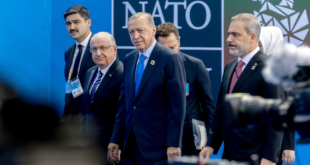KABUL (AFP) – US Secretary of Defence Robert Gates arrived in Afghanistan late Monday for a surprise visit to evaluate international efforts against rising violence led by Taliban rebels allied with Al-Qaeda.
The “clear concern is that for two or three years there has been an increase of overall level of violence (in Afghanistan),” Gates told reporters during a short stopover in Djibouti en route to Kabul.
The defence secretary said he wanted an update on the security situation here, especially in the south where the Taliban are most active, and to assess if there was any spillover from extremist activity in Pakistan.
“I want to see if there are any consequences visible in Afghanistan from the trouble in Pakistan,” he said.
The two neighbours share a long and porous border across which Islamist rebels regularly cross to carry out attacks on the government and the 55,000 international troops supporting it.
Gates, who was last in Afghanistan in June, was due to meet Afghan President Hamid Karzai on Tuesday as well as with the commanders of the US-led coalition and separate NATO-led International Security Assistance Force (ISAF).
His visit will inform a meeting in Scotland later this month with some of the ISAF nations that have troops in the south where Taliban militants are most active.
This year has been the worst of the Taliban-led insurgency since the hardliners were removed from government in late 2001 in a US-led invasion launched after they did not surrender Al-Qaeda leaders for the 9/11 attacks.
Nearly 6,000 people have been killed — most of them rebels — and there have been around 140 suicide blasts, the worst killed nearly 80 people a month ago in the north — which has seen less of the unrest than the south and east.
“There are early indicators that there may be some stepped up activity by Al-Qaeda (in Afghanistan),” a top US defence official travelling with Gates said on condition of anonymity.
This comes as the Islamist network has suffered setbacks in Iraq.
Military officials have reported more foreign “jihadists” on the battlefield in Afghanistan while weapons entering the country from Iran and intended for the insurgents have been intercepted.
“We have pretty good evidence some of the new recruits come from Pakistan, other neighbouring countries and Afghanistan itself,” an official said.
Also, “We are troubled by activities of Iran supporting the insurgents in Afghanistan.”
There was “good evidence” of support — mainly in the form of finances and weapons — coming from Iran, he said, adding, “The motive could be producing additional challenges to the international forces.”
There was also an increase of funding going towards the insurgents “from a variety of sources,” he said. This included from taxation of opium production, of which Afghanistan is the world’s main supplier, and the Middle East.
With the violence intensifying and claiming more lives, some of the 38 nations in ISAF are reassessing their involvement in the campaign led by the United States — the largest contributor of troops and aid.
Many countries are contributing to efforts to train and equip the growing Afghan security forces but they are still not able handle Afghanistan’s considerable security problems alone.
The United States is proposing to both equip and arm some forces in Afghanistan, mainly in the troubled south and east, to help maintain order, one official said, along the same lines as the Sunni tribes in Iraq.
“We should pay more attention to tribes and locals,” he said.
 Eurasia Press & News
Eurasia Press & News



